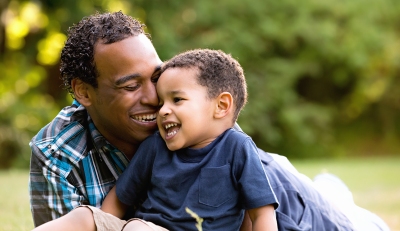
When Your Child Has a "Favourite Parent"
Parent & Child School Admin 28 Apr 2025 0
A preference for one parent is normal but can hurt — here is how to handle the situation
“I don’t want you. I want Daddy!” “Mommy is nicer than Daddy.” “I wish I had a different Mom.” As hard as it may be to hear these things, a child favoring one parent over another is a completely normal part of parenting. But this kind of challenge can come up unexpectedly and even leave parents in a "fight or flight" response in which they either engage emotionally with a child or withdraw from interactions. As normal as it can be for a child to express preferences, it doesn’t mean that this experience isn’t hard for parents to deal with.
Once again, positive discipline can provide a framework for finding a way through a potential emotional minefield. As we parent with love and limits, we both listen to the child’s experience (never negating what they feel), while giving them boundaries in how they express their feelings.
Who are you? Who is your child?
This issue can also bring up the challenge of parenting a child who is very similar to you OR very different from you. Parent-child dyads with similar temperaments can get along well, but often the conflict of having to separate and individuate can be harder for the child. As for the parent, the challenging aspects of her child’s personality might bother her more because she sees the same characteristics in herself and knows the struggle of living in the world with these challenges.
For parents whose children are very different in personality, the struggle is more likely to come up around empathy. How can these parents find common ground with their children and work to understand their child’s point of view? Self-reflection can help. In what ways is your child similar or different from you? Which qualities in your child do you deeply admire? Which qualities get on your nerves? From this deeper reflection, you can more clearly understand your relationship with your child and work to strengthen it.
Developmental stages
Children are often playing with their own power and control. They want independence but also connection. They can feel trapped in the push-pull dynamic of needing their parent desperately but also needing to assert who they are as a separate individual. At times, this dynamic can assert itself in a child identifying more with one parent’s qualities and way of being in the world. Instead of dwelling in hurt feelings, a parent can see this time as an opportunity for growth and development for our children.
Feelings first, but also moving forward
As in all interactions, you are modeling for your child how to handle emotions in a healthy way. I believe that it is fine for you to express your feelings when a child says that she likes the other parent more, but do this in a contained but authentic way, conveying the message that it’s okay to feel anything, but it’s not okay to say anything or do anything. What we say and do affect the people around us. This is at the very heart of relationships. We want our children to be open and expressive with us and sometimes that comes with difficult messages. But children also need to learn to be responsible for their own actions.
In this situation, you need to be the bigger person and assert that you can handle whatever they bring to you with equanimity. Of course, this might mean that you need to get support from your own adult friends. If a child has deeply hurt your feelings, you will need to be supported in your own feelings. Just avoid asking a child to protect or comfort you to a large extent.
Rewrite history
If you are feeling emotionally challenged by a child’s rejection, it may benefit you to look at your own attachment history and family of origin.
Perhaps you experienced a challenging relationship with your own parents. Or, alternatively, maybe you have an incredibly strong relationship with your own parents. Neither one of these stories is necessarily the one that you will have with your child. Be self-reflective. What parts of your own history have led you to be the parent you are now? Why does this rejection affect you the way that it does? What kind of thoughts do you have when your child prefers the other parent or caregiver over you? Are these based in reality or based on a story that you are telling yourself?
The beautiful thing about parenting is that we are called every day to show up and be present for our kids. Every day offers a new chance to live our values and build the relationship that you want to have with your child.
Build the relationship
In this context, how do you go about building the relationship with your child? As kids grow up they develop a wider range of interests and we can work to find common interests with them.
Staying calm and connected in the midst of conflict may be the hardest thing we do as a parent, but remember how much you love your child and feel confident that he loves you with intensity, even when it doesn’t feel like it.
Think about your own hobbies, the activities that bring you joy, and find ways to include your child in them. Pay attention to your child’s interests and find common ground. I never thought that I would know so much about the Seattle Sounders, but living with my 10-year-old son’s enthusiasm for the team has created a space of shared interest that has strengthened our relationship.
Trust the attachment
Remember that you are incredibly important to your child. Your influence and your love are at the core of how your child sees himself in the world. You need to be the steady presence that is unshaken by the waves of a child’s whims. Staying calm and connected in the midst of conflict may be the hardest thing we do as a parent, but remember how much you love your child and feel confident that he loves you with intensity, even when it doesn’t feel like it.
Avoid catastrophic thinking
Most of all, remember that whatever is going on right now with your child is unlikely to last long. Children move through stages quickly even though they can feel interminable when we’re in it them. In the meantime, treat yourself kindly and get support when you need it.
Scenarios
A couple of scenarios might be helpful in understanding parental favoritism.
1. Paul is a stay-at-home dad parenting a 2-year-old son. The two enjoy their time together during the day but as soon as Paul’s wife returns home in the evening, their son wants nothing to do with Paul. He will whine and ask for his mom, and Paul feels simultaneously rejected and relieved that he can have time for himself. This ambivalence surprises him and he’s unsure of how to respond to his son.
In this instance, I would urge Paul to not take his son’s rejection personally. His son spends the majority of the day with him and is eager to reconnect with his mother in the evening. Paul can use this time to take care of himself and perhaps to do things around the house that don’t get done during the day. He should aim to trust the connection that he has with his son and feel gratitude that his son feels attached to the other parent as well.
2. Lisa and Margaret are parents to two small children. Lately, the children only want Lisa to put them to bed, saying to Margaret that she’s not as cuddly as Lisa. Margaret feels hurt.
I would counsel Margaret to tell her children that this feels hurtful, but to stay contained in her emotions when she talks to them. Let them see the impact of how they act on others, without guilt or shame. I would honor and respect the children’s feelings, while also making it clear that Margaret and Lisa have several choices in how to practically move forward. One, Margaret could give this time to Lisa and the kids, knowing that she is building a strong relationship with the children during other times of the day. Two, Margaret and Lisa could work out a plan with the children that most night Lisa puts the kids to bed, but that Margaret will do it on certain nights. Three, Margaret and Lisa could put the kids to bed together, building on Margaret’s strength as a story reader and Lisa’s cuddling proficiency.
The key is to acknowledge everybody’s feelings and then to move forward with kindness and transparency. Everybody in this situation wants to feel valued and loved and, as in most times in life, there are many ways to go about honoring feelings and remaining respectful at the same time.
Originally published by Sarina Natkin Parenting.




Leave a Comment